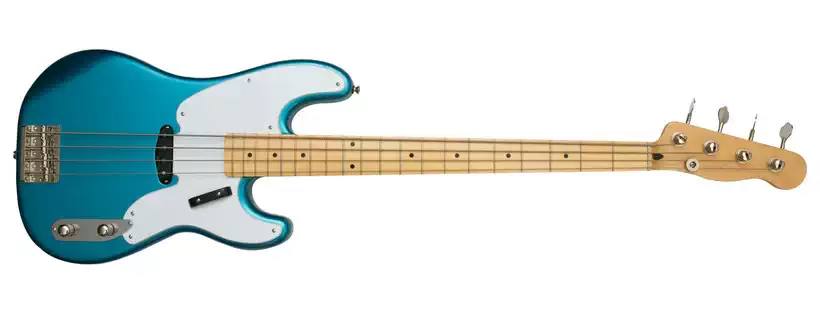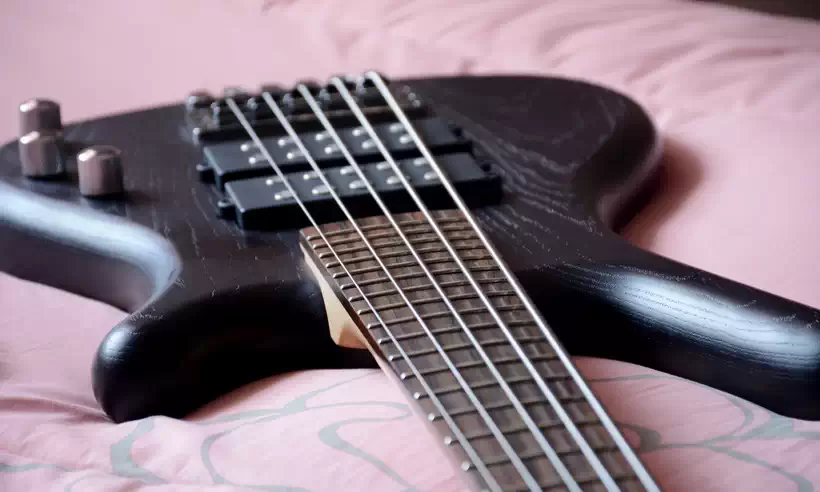Whether you’re just getting into bass playing or are looking to expand your range, the question of the 4-string vs 5-string bass guitar is an enduring one. And while you’re the best person to assess your playing style, the following tips may help you in your decision.
How Much Does An Extra Low B String Matter?
Bass is often an undervalued component in the composition of a song. Casual listeners may not even notice it until it’s removed. And whether you’re looking to add a bass track to your music or want to play bass as part of a band, you likely know that bass is an underappreciated facet in most musical genres.
Most bass guitars have four strings. The four strings make them a favorite of many new musicians, as learning to deal with the four strings of a bass (as opposed to the six strings of many guitars) seems more straightforward.
However, the 5-string bass is a useful and versatile tool in the world of music. The extra b-string serves to expand the low end of sounds you can produce. As we’ve moved culturally to a world of digitally-created music, lower-end bass has become a foundation, and a 5-string bass helps bass players of all abilities to reach those low notes.
Is It Harder To Play With Five String Basses?
A 5-string bass unequivocally expands your playing range. That said, when you consider purchasing a four-string vs five-string bass, it’s essential to consider how an extra string impacts your playing experience. Here are some of the things to consider before buying:
- More strings to keep quiet–This may seem obvious. However, as any bass player knows, the challenge of playing involves keeping unplayed strings quiet. Especially if you’re new to bass, this can be a challenge. A fifth string offers you a wider playing range, but it’s also another string you need to keep quieter.
- A wider neck— The larger neck width may not pose much of an issue, especially if you have larger hands. However, if your hands are small or if you have short fingers, the broader neck that happens as a result of having an extra string may make playing more challenging.
- Closer spacing–More strings usually means you’ll end up with a wider-necked bass. However, most manufacturers compress the string spacing a bit when making a five-string bass to make playing more feasible. The extra string isn’t necessarily a bad thing. However, if you are accustomed to playing a four-string bass or if you have larger fingers, this may be a bit of an adjustment.
- More weight–The extra weight may not be much, but if you frequently play live, it’s worth considering that five-string basses almost always outweigh their four-string counterparts.
Questions To Ask Yourself Before Buying
A musical instrument is a significant purchase, and it’s wise to think carefully before deciding what bass to buy. Here are some questions to ask before deciding on a four-string vs five-string bass:
- What genre will I be playing?–If you’re playing pop or folk music; the chances are good that you won’t need the added low end of a five-string bass. However, if you play hip-hop or some other genres, that extra string may be just what you need to reach the lower-frequency bass that you often hear.
- Will I use the extra string?–This question is vital to consider if you are a beginning bassist. While a five-string bass is an excellent option for those planning to play in lower frequencies, the fifth string isn’t always (or even often) used. And because a five-string bass is usually more expensive than a four-string one, you may not want to spend the extra money on something you might not need.
- Do I need even more range?–The Five-string basses expand the sonic range of the bass guitar. That said, some players may want to expand their playing range even more. If you’re an adventurous bass player who wants to develop your skills further, you might prefer a six-string bass over both the four-string and the five-string.
The Advantages Of Each
When it comes to choosing between the four-string or the five-string bass, there’s no wrong answer–it all comes down to your personal preference. With that said, here are some of the advantages of each one:
Four Strings
- Easier to master — 4 strings are easier to master than 5. If you’re a beginner, a four-string bass is sure to be less overwhelming to learn.
- A narrower fretboard — A narrower fretboard makes moving between notes easier, especially if you have smaller hands or are new to bass.
- Less expensive — A fifth string means a manufacturer has to use more of each material when making a guitar, which translates to a higher cost for the buyer.
- Easier for sound engineering — An extra string adds many new frequencies to a given song. The extra string can make mixing and mastering a track more difficult.

Five Strings
- Expanded range–A five-string bass expands the low end you can reach. In genres where you need more bass, this is especially desirable.
- Richer low end–Many musical genres sound better with full, rich bass. Since the fifth string is larger than the fourth, a five-string bass may add some warmth to your playing.
- Better efficiency when playing–With the 5th string, you have alternate fingerings for some notes. This can make it easier to play and more efficient to switch between them. Faster switching isn’t always necessary, but if you play a lot of up-tempo music with dynamic basslines, this can make a world of difference.

Final Thoughts
The bottom line here is to think of a five-string bass as adding something extra. You can play most genres perfectly well with a four-string bass, but that extra string can make a difference in certain situations. Before buying, think about the kind of music you play (or want to play) and go from there.
